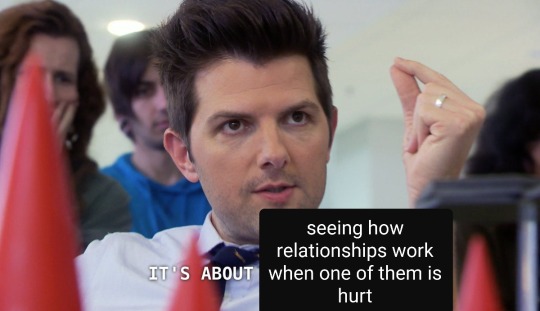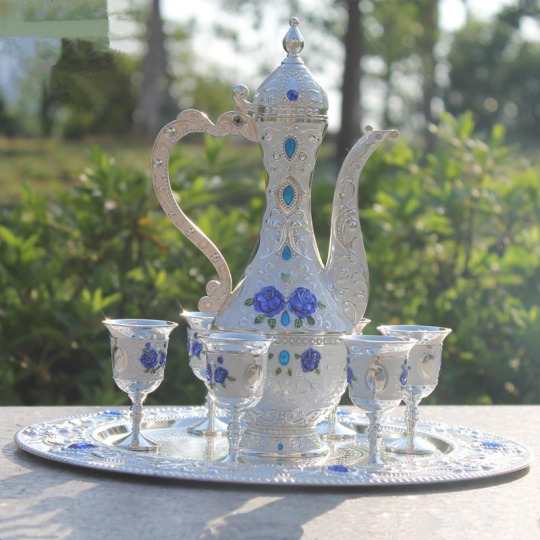Text
So uh, my vague concept of Legs starting out Generically Wholesome has been obliterated by the fact that she needs to know how to entertain Chrysalis.
Yeah, no, Legs is going to have some of those I-thought-that-was-normal-not-horrifying moments.
16 notes
·
View notes
Text
Hellebore news: So guess who just learned about how to use a drop spindle and is immediately adding this fibercraft to Hellebore’s skillset. Human hair doesn’t spin well on its own but blends work. I already had her using her own hair as thread, but spinning it mixed with some other fiber into a fine continuous thread would be neat. Springy, retains her sturdiness, toxicity, and desecrative properties. Fun arts and crafts times.
Tartarus news: The Chrysalis whump levels are staggering and I’ve barely introduced Legs.
2 notes
·
View notes
Text
I have no RP energy but I DO have “More Hellebore Culture Shock” energy
Hellebore doesn’t get cliffhanger scenes. Normal humanoids can’t just relax their arms and let their tendons lock into a gripping-at-rest position like a bat? She finds your lack of arboreal mutations disturbing and suspicious.
Also, normal-sized bugs wig her out. Things that small shouldn’t have any legs, much less that many. They’re supposed to be, you know, sentient beads that roll around, doing sentient bead things, like gardening.
2 notes
·
View notes
Text
Hellebore did not stay in the Heart of the Forest for most of her life just because she was the Wolf Matron’s favorite during that period. The Thousand Pilfered Young all offend the Thousand Names by their existence/their role in the growth cycle. For most of them, that means he is aggressively indifferent to their safety and survival, but he’s exceptionally offended by the 999th. The first thing a new Bone Weaver does, after all, is ruin the perfection of the Forest by making a new Tree. And then it is no longer his Forest, but his successor’s, and he will be killed to make way for a new cycle. As part of his duality with the Wolf Matron, who embraces her death as the culmination of her being, the Thousand Names struggles until the very end to keep his life.
Hellebore represents the end of his everything. The Thousandth does, too, but the ritual happens so quickly after their arrival that there’s barely time to resent them. The Thousand Names can’t attack the Pilfered Young within the sphere of the Wolf Matron’s protection, but outside of it? A stray 999th is not going to survive crossing his path.
1 note
·
View note
Text
Insomnia. Next ques--
Briar: Fear of what he might wake up to.
Averna: The question of how and why ghosts (she still thinks she’s a ghost) can even sleep.
Acerbus: He has the opposite problem of sleeping too much.
Legs: The knowledge that, by saving the two people she loves the most in all the world, she started a war that killed tens of thousands. The knowledge that she would do it again.
Hellebore: Time is foolish and she has no circadian rhythm whatsoever. She sleeps when she wants and she rarely wants to.
What keeps your OC awake at night?
210 notes
·
View notes
Text
All I listen to is angst music please send me sweet bouncy positive songs to vet.
1 note
·
View note
Text
I have exactly two songs on my Legs Dragonfriend playlist. I’d like to expand that, but at the moment it very starkly sets out the duality of this character:
PON PON Dance it through
Don't know where I'm going to
and
The river of life is all filled with sins
The water I drink is the blood on my hands
1 note
·
View note
Text
You have no idea how much Briar loves trashy bodice-ripper romance novels. Part of it is trauma-processing. Part of it is the fantasy of someone big and strong passionately desiring him but also being completely nonthreatening because he can put the book down at any time. He doesn’t send it to anyone to freak them out, though.
And Averna’s into snuff because of course she is.
Which OC enjoys consuming questionable media? Who do they send said questionable media to to freak them out?
98 notes
·
View notes
Text
:D!!
Little’s gained by those afraid of dirt between their toes
And mind the cost of time you’ve lost by weeping of your woes.
Hope and pray your toil away’s not how the story goes
So do your chores and keep your scores because the Forest knows.
8 notes
·
View notes
Text
@alastorology I finally finished that Forest poem Hellebore quoted the first line of to Alastor once.
Little’s gained by those afraid of dirt between their toes
And mind the cost of time you’ve lost by weeping of your woes.
Hope and pray your toil away’s not how the story goes
So do your chores and keep your scores because the Forest knows.
8 notes
·
View notes
Note
Thank you for answering. I’m aware this character’s condition only bears the most superficial resemblance to reincarnation as seen in real-world religions. I just didn’t know a better word for “this character can’t stay dead because he keeps getting his soul/mind shunted into a new fetus as a loophole to keep the death god he pissed off from being required to let him into his non-Earth fantasy setting’s afterlife,” but I now realize I still probably shouldn’t call it that.
In light of your feedback, I’m going to either cut back his time on the island to less than a year or rework that part of his backstory entirely. Thank you!
I’ve got a cursed reincarnating character who spends over a decade on a deserted island because he can only die by homicide between the ages of 15 to 29 under normal circumstances and his previous death was preceded by five months of torture. He moves to the island at 14 and between his symptoms and his symptoms and mistakes made by his bio family that life stopped him from forming any kind of constructive or healing relationship with them. (1/2)
I know the isolation tanks his already poor mental health, but I’m having trouble finding anything about isolation on an island rather than in a cell. His survival until his time runs out and he’s killed by direct divine intervention is a foregone conclusion, not because he isn’t suicidal (he is), but increasingly unlikely coincidences foil his attempts, and refusing to perform basic survival tasks leads to the curse giving him blackouts during which he performs those tasks against his will(2/2)
-
I don’t think this is a bad idea but I do find it difficult to answer questions where characters can’t die because there isn’t a data set I can look to for information.
And, I know this is a very common way to approach things in Western literature but… this isn’t how reincarnation is supposed to work. The conceptualisation of life as suffering is more to do with the inescapable nature of pain and hunger while we’re alive. And the fact that it’s impossible to live without harming something (even if that something is plants). The memories from past lives are not really supposed to be accessible to most people.
I think that if we are treating this realistically then having memories of torture and then going into solitary confinement for such a long period at a young age is probably going to be lethal. This is a scenario that should kill the character several time over, which you know because you’ve accounted for it.
So I think what I’m going to do here is just talk about the effects of isolation a little bit and talk about what we know about isolation in remote area versus solitary confinement.
Firstly most of the data and systematic studies I’m aware of focus on solitary confinement. This makes sense because it’s relatively easy to define, ensure and measure. Isolation within a community can be trickier to define and is not always as consistent.
For instance someone who lives alone in an isolated house out of town might not have any human contact during the week, while having over seven hours of human contact on the weekend. That would probably still be bad for most people but it is a different situation to consistent isolation of solitary confinement and any study has to account for that variation.
Experiments involving voluntary confinement strongly suggest that knowing a release date is a protective factor. It helps people deal with isolation. Having a cause, for instance a political reason they were put in solitary confinement, may also help people to deal with the effects but this is less clear.
I’m not sure that your character can be thought of as having a cause. Because the way you’ve described him it sounds like he felt forced into taking this action. Even though it’s his choice I’m getting the impression he feels like he has no other option.
And that’s different to accepting something as the consequences of your own actions or beliefs. However unjust the consequences are.
Most of the accounts I have that are similar to your idea (isolation in a remote natural environment) are either modern interviews or historical accounts.
My impression from both is that voluntary isolation definitely still leads to symptoms. There also seems to be a significant degree of self-selection at work: people who have naturally higher tolerances for isolation are more likely to want to live in isolation or do jobs that involve being away from others for prolonged periods.
And anyone who has a normal tolerance for isolation tries they tend to quit because they find it unbearable.
I should have mentioned this before but for context the ‘safe’ period for solitary confinement (and so far as we know isolation generally) is about a week.
People can, and have, voluntarily isolated themselves for far longer. There is significant variation in our tolerances for isolation and some individuals are much more tolerant of isolation then others.
But these individuals are rare.
And unusually high tolerance for isolation is unlikely to be much protection over really extreme lengths of time. Like several years.
Individuals who voluntarily isolate themselves for years at a time- Well I can’t say I’ve conducted a systematic study. I have not. But the interviews I’ve read with these people strongly suggest that they are experiencing symptoms.
They just seem capable of re-framing those symptoms and trying to pass them off as ordinary or positive.
I particularly remember an interview with a religious individual who was isolating herself in conditions akin to solitary confinement, as an act of faith. She reported having visual and auditory hallucinations, which are a known symptom of solitary confinement. But she discussed them as a religious experience, not a symptom.
She also described what sounded like severe depressive episodes and downplayed them as ‘normal’ or at least ‘not serious’.
To reiterate, this style of living was this woman’s choice and I don’t mean this to sound judgemental. I just don’t think it was/is a healthy choice.
And all of that means that I would expect someone in the situation you’ve described to… Well die. Pretty quickly.
The isolation is coerced, which means there aren’t really any protective factors at work here.
The character is extremely young (most of the children referenced in studies of solitary confinement are 16-17, though I have heard of a case of a 12 year old which was the point I turned into a livid ticking column of smoke and gave up for the afternoon.) The character has pre-existing mental health problems. The character doesn’t expect the situation to ever end or improve.
And all of those are factors that would make the effects of isolation worse.
From the set up I understand that the character’s suffering is part of the point here, as is the idea that this is a lethal length of time. However I think that both points could be made with a much much shorter time frame. I think stretching the time period out to over a decade is just-
Well frankly I think it’s a little ridiculous and I think that using such an extreme length of time risks feeding in to perceptions of isolation as ‘harmless’.
A week is the ‘safe’ period. A year is more then enough time for the effects and events you’re planning to write.
So I guess I’d ask you to consider whether the time frame of ten years really adds anything to the story. If it does, by all means keep it (though please make the effort to hammer home how ridiculous a time frame it is.) If it doesn’t consider reducing it to an equally lethal, though less ludicrous, time frame.
I think that sources you have on solitary confinement will, for the most part, hold true for isolation in a remote environment. Some of the physical effects, particularly poor eyesight, may be down to cell conditions. But the psychological effects appear to be purely due to a lack of human contact.
I hope that helps. :)
Available on Wordpress.
Disclaimer
13 notes
·
View notes
Photo


44K notes
·
View notes
Text





What appeals to me about whump: an incomplete list
124K notes
·
View notes
Text
I never thought I’d be so obsessed with tea sets but oh my GODS

Just LOOK at this!

And these!









Cottagecore bunny set anyone?

And the most expensive teapot in the world is smol

6K notes
·
View notes
Text
I have been such a fool
Look at this:

Look at the sheer number of different kinds of trimming that are covering this mess.

This is hideous and Hellebore would love it. I have been going about her patchwork overdress all wrong. Look at all that. This just needs to be black with eye-searing accents and I’d be halfway there.
2 notes
·
View notes
Text
Everyone keeps drawing Briar with a bandana around his neck and it’s super cute so I guess it’s part of his design now. XD
0 notes